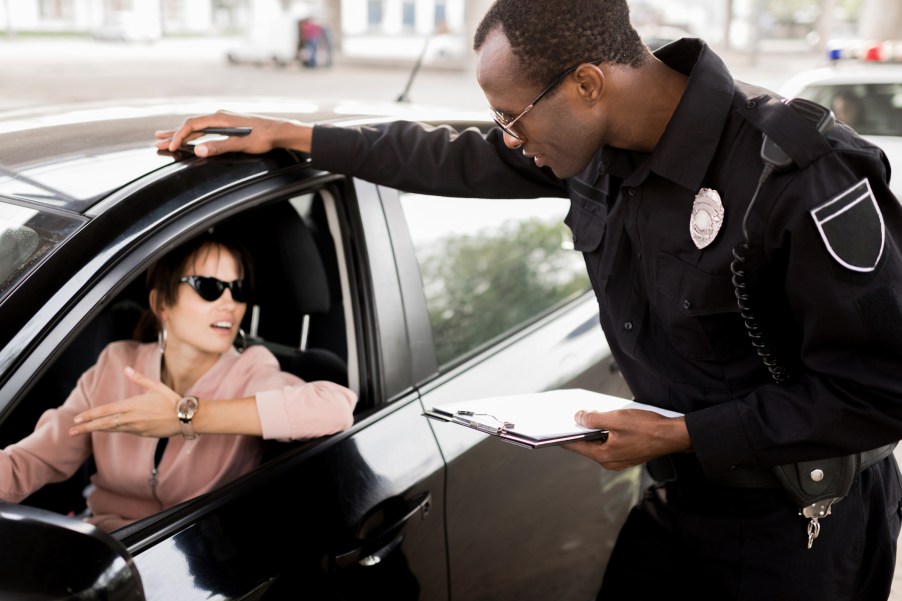
Protect yourself with smart, polite responses to traffic stop questions
You’re cruising down the road when suddenly, flashing lights appear behind you. Panic sets in for most of us during a traffic stop, and as we fumble for answers we say far too much. Others escalate the situation with confrontational replies. But Andrew Flusche, an attorney and true Southern gentleman, offers a different approach. Known for his bowtie and calm demeanor, Flusche asserts that you can protect your rights without being a jerk. In a recent video, he applied his polite but firm strategy to some of the most common traffic stop questions. Here’s how he handles each one.
1. “Do you know why I pulled you over?”
A simple “nope” is the best response. Flusche emphasizes that admitting to anything could harm your case. “You’ve admitted to breaking the law,” Flusche warns, which could be used against you later. It’s crucial to stay neutral and not offer up more than necessary.
2. “How much have you had to drink tonight?”
Here, Flusche recommends, “I’m invoking my right to remain silent.” By saying this, you avoid giving the officer any evidence they could use against you. Even a seemingly innocent reply like “just a couple of beers” can lead to further probing. Silence is your best shield.
3. “Could you please step out of the vehicle to do some quick tests for me?”
Stay silent and do not consent. As Flusche explains, roadside tests are difficult even for sober people and aren’t required by law. “You’ve just consented to do roadside tests,” he explains, and silence helps avoid setting yourself up for failure.
4. “I saw your phone in your hand, you were texting, weren’t you?”
Texting while driving can be tricky to prove in some places, such as Flusche’s native Virginia at the time of filming. The officer must prove you were typing, not just holding your phone. “He has to be able to testify that you were inputting letters,” Flusche explains. Admitting to texting gives the officer exactly what they need to move forward.
5. “You don’t have any guns or drugs in the vehicle, do you?”
Flusche’s go-to response? “I’ll remain silent.” Staying quiet is critical in preventing the officer from digging deeper. The less information you give, the fewer opportunities they have to pursue further investigation.
6. “You don’t mind if I take a look around, right?”
Here, Flusche advises asking, “Am I free to leave?” rather than consenting to a search. This ensures the officer can’t extend the stop without probable cause. And even then, they must search for evidence of one specific crime they suspect you committed. Agreeing to a search gives them a “blank check” to rifle through your vehicle for any evidence.
7. “I smell marijuana in the vehicle. I’m going to find it anyway, so you might as well tell me where it is.”
Remain silent again, stating, “I don’t consent to any searches.” Even if the officer does search, they still need to prove you knew the substance was there. Admitting where something is can quickly lead to a possession charge, so it’s best to stay quiet.
The Importance of Being Polite
Andrew Flusche’s key message? Don’t be a jerk. “You can exercise your rights and remain silent and not consent to tests without being a jerk,” he explains. While it’s crucial to stand up for your rights, Flusche insists it’s equally important to be respectful. “It’s never going to help you to be a jerk to a police officer. You should be polite, but you don’t necessarily have to cooperate and do everything that the police ask you to do.”
He continues, “through all this, remember to be polite. You don’t have to do everything the police officer asks, but you cannot obstruct justice.” Flusche’s approach strikes a balance between protecting your rights and not escalating the situation.
Conclusion
During a stressful traffic stop, it’s easy to feel overwhelmed or panicked. But Andrew Flusche demonstrates that by remaining calm, polite, and quiet, you can navigate these interactions without unnecessary trouble. His key advice? Say as little as possible, refuse unnecessary tests, and be respectful at all times. By following his approach, you can protect your rights without making a bad situation worse.
See Attorney Andrew Flusche’s responses to these common traffic stop questions for yourself in the video below:



